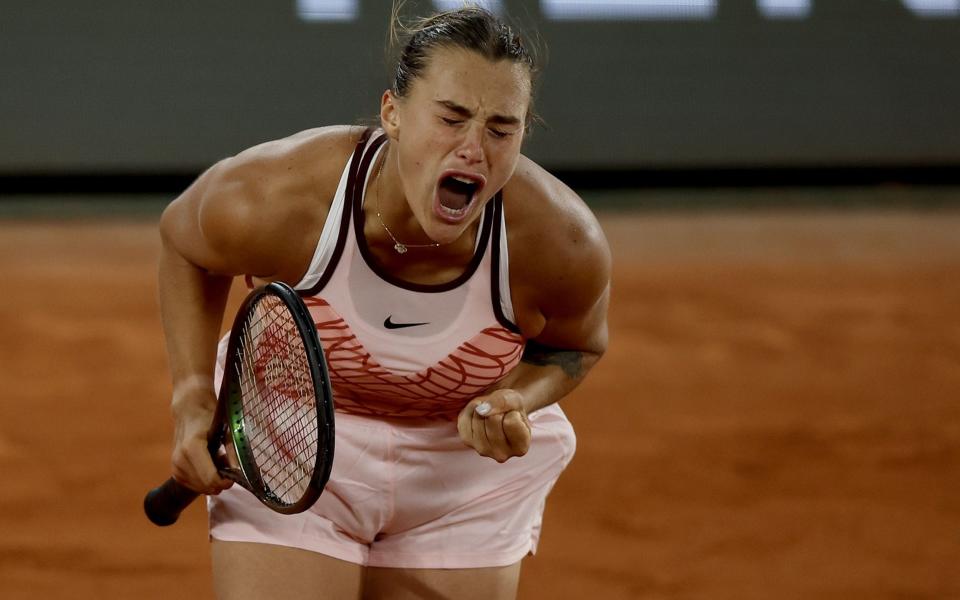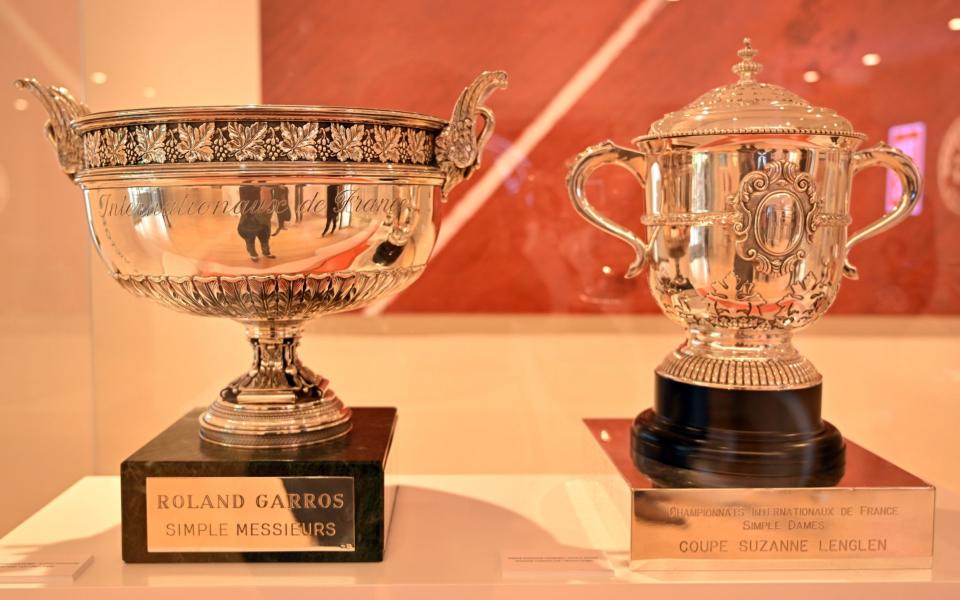French Open schedule 2023: How to watch and today’s order of play

Novak Djokovic beat Peru’s Juan Pablo Varillas 6-3, 6-2, 6-2 on the Roland Garros clay to move ahead of Rafael Nadal and take sole ownership of the record for most appearances in the French Open quarter-finals.
The Serb is also aiming to overtake Nadal by winning a record 23rd men’s grand slam singles title.
In the women’s draw, world No 2 Aryna Sabalenka beat American Sloane Stephens in straight sets but again, just like her third-round victory, Sabalenka did not attend the post-match press conference amid tension about repeatedly facing questions over Belarus’s role in the war in Ukraine
Elsewhere, Aldila Sutjiadi and Miyu Kato were disqualified from their doubles match after the latter struck a ball to the opposite end of the court between points and accidently hit a ball girl.
Monday’s order of play
(All times local, +1 hour from BST)
Philippe Chatrier
11:00: Bernarda Pera (USA) v (7) Ons Jabeur (Tun), Nicolas Jarry (Chi) v (4) Casper Ruud (Nor), Anna Karolina Schmiedlova (Svk) v (6) Cori Gauff (USA), (28) Grigor Dimitrov (Bul) v (22) Alexander Zverev (Ger)
Suzanne Lenglen
11:00: Sara Sorribes Tormo (Spa) v (14) Beatriz Haddad Maia (Bra), (6) Holger Vitus Nodskov Rune (Den) v (23) Francisco Cerundolo (Arg), (1) Iga Swiatek (Pol) v Lesia Tsurenko (Ukr), Tomas Martin Etcheverry (Arg) v (27) Yoshihito Nishioka (Jpn)
Simonne Mathieu
11:00: (14) Latisha Chan (Tpe) & Hao-Ching Chan (Tpe) v Alize Cornet (Fra) & Diane Parry (Fra), Su-Wei Hsieh (Tpe) & Xin Yu Wang (Chn) v (5) Desirae Krawczyk (USA) & Demi Schuurs (Ned), Sander Gille (Bel) & Joran Vliegen (Bel) v (14) Maximo Gonzalez (Arg) & Andres Molteni (Arg), (12) Matwe Middelkoop (Ned) & Andreas Mies (Ger) v (3) Marcelo Arevalo (Esa) & Jean-Julien Rojer (Ned)
Court 14
11:00: (8) Gabriela Dabrowski (Can) & Luisa Stefani (Bra) v (10) Leylah Annie Fernandez (Can) & Taylor Townsend (USA), (3) Storm Hunter (Aus) & Elise Mertens (Bel) v (15) Veronika Kudermetova (Rus) & Ludmilla Samsonova (Rus), Miyu Kato (Jpn) & Tim Puetz (Ger) v Luisa Stefani (Bra) & Rafael Matos (Bra), Asia Muhammad (USA) & Lloyd Glasspool (Gbr) v Gabriela Dabrowski (Can) & Nathaniel Lammons (USA)
How to watch the French Open 2023 on TV
In the UK, Eurosport has the broadcasting rights to live action from Paris. 273 live hours will be shown on Eurosport 1 and Eurosport 2 complementing the digital offering on discovery+ and the Eurosport App – where every match will be available to watch live throughout the tournament.
Every qualifying, wheelchair, junior and legends match will be available to watch live.
Eurosport’s on-site presentation team includes multiple grand slam winners Mats Wilander, Chris Evert and John McEnroe, who join Alex Corretja, Laura Robson and Alizé Lim in Paris. World No 4 and 2022 finalist Casper Ruud will also offer his insights. Tim Henman and Barbara Schett will anchor coverage from the mixed-reality Cube studio in London before presenting live from Paris from the semi-final stage of the tournament.
To watch on discovery+, an entertainment and sport pass is £6.99/month or £59.99/year.
In the United States the tournament is broadcast on ESPN.
When is the French Open 2023 final?
The women’s final will take place on June 10. The men’s final is on June 11.
What is the French Open prize money?
The French Open total prize pool is €49.6 million (£43.2 million), up 12.3 per cent on 2022. The men’s and women’s singles champions will each take home €2.3 million (£2 million) and the finalists will earn €1.15 million (£1 million).

Which British players are involved?
None in the men’s or women’s singles. Cameron Norrie’s tournament ended with a crushing third-round defeat to Lorenzo Musetti. Jack Draper retired from his match against Tomas Etcheverry with a shoulder problem while Dan Evans went out in the first round, losing 6-4, 6-4, 6-4 to Australia’s Thanasi Kokkinakis.
Britons are notably absent on the women’s side, after a dreadful qualifying tournament and due to the absence of Emma Raducanu through injury. It is the first time since 2009 that no British women have featured in the main draw at a major.
Why is Andy Murray not playing in Paris?
Andy Murray withdrew from this year’s French Open to prioritise the grass-court season in the build-up to Wimbledon.
Murray was beaten in the first round of the Italian Open and made another early exit on clay after losing to Stan Wawrinka at an ATP Challenger event in Bordeaux.
The 36-year-old is understood to still be considering which tournaments to target and they may include Surbiton from June 4-11 and then Queen’s from June 19-25.
Who are the defending champions?
Last year, Rafael Nadal became the first man to win 22nd major singles titles after sweeping aside eighth seed Ruud 6–3, 6–3, 6–0.
Swiatek solidified her status as the world’s best women’s player when she overwhelmed Gauff, who was playing in her first major singles final, 6–1, 6–3.
What are the best of the latest odds?
Having a bet at Roland Garros? Find the best French Open betting offers and free bets
Men’s singles:
Carlos Alcaraz 11/8
Novak Djokovic 9/5
Holger Rune 8/1
Alexander Zverev 16/1
Stefanos Tsitsipas 16/1
Women’s singles:
Iga Swiatek 4/7
Aryna Sabalenka 7/2
Ons Jabeur 14/1
Coco Gauff 20/1
Odds correct as of June 4
Sabalenka withstands brave Stephens fightback
By Molly McElwee in Paris
Belarus’s Aryna Sabalenka set up a politically charged quarter-final against Ukraine’s Elina Svitolina at Roland Garros, but continued her boycott of open press conferences.
The world No 2 has had an impressive week in Paris, reaching her first quarter-final here after a hard-fought – if error-strewn – 7-6, 6-4 win over American Sloane Stephens. But her results have been clouded by external tensions, as she has repeatedly faced questions over Belarus’s role in the war in Ukraine.
Following a heated exchange with a Ukrainian journalist last week, in which her previous personal links to president Alexander Lukashenko were highlighted, Sabalenka, 25, said she “did not feel safe” and opted out of a general press conference after her third-round match on Friday night.
She did the same thing after her win yesterday, instead taking questions from a WTA representative, who did not ask about the politics surrounding her match with former world No 3 Svitolina. The quarter-final will undoubtedly offer another chapter to this unwanted saga.
Asked about the prospect of playing Sabalenka, considering the noise around her this past week, Svitolina was unmoved: “Well, I have played the last two matches against Russian players so it will not change, everything will be same. I’m used to it now, it’s going to be the same.”
Australian Open champion Sabalenka had her toughest test so far on the court against Stephens, despite storming to a 5-0 lead within 20 minutes. It looked like the match was going to be a complete wipeout, but the American capitalised on Sabalenka’s mounting error card and made it a contest.
It was the first time this tournament that a women’s match was scheduled in the prime-time night session on Philippe-Chatrier, reserved for what organisers deem the match of the day. As a meeting between two grand slam champions, it was more than worthy of the billing. But there still remained a certain pressure to deliver a good show, because the women’s draw had been snubbed seven nights in a row by tournament director Amelie Mauresmo.
This is partly due to fears a two-set rout would leave punters – who buy tickets for just one match – short-changed. The French crowd can be brutal too. When Sabalenka went a double-break up, one spectator shouted, “All for you Amelie” and smatterings of laughter rippled around the stadium.
But Stephens, a former US Open champion and a finalist in Paris five years ago, did not go down without a fight. She won five games in a row, saved three set points and pushed Sabalenka to a testy tie-break. The crowd got right behind her, and even booed Sabalenka, who leaked 25 unforced errors in the opening set – six more than she had hit in her entire third round match. Stephens, 30, was probably the better player in the tie-break, but Sabalenka somehow stopped her surge when it mattered.
She doubled over and clenched her fist when she clinched the tie-break 7-5 with an unreturnable serve. Once she contained her mistakes in the second set, Sabalenka’s all-out attacking force was too good for smooth and serene defender Stephens. This was Sabalenka’s 33rd win of the year – a world leading tally – and keeps her on track for a projected showdown in the final with world No 1 Iga Swiatek.
But facing Svitolina tomorrow will be a massive test of her mental resilience, in possibly the most high profile sporting contest between a Ukrainian and Belarusian or Russian player since the conflict began 17 months ago. “She’s playing really great tennis here in Paris, moving well,” Sabalenka said of Svitolina. “I just have to be patient and wait for that perfect shot to finish the point. Don’t rush myself. Just go there and fight and show my best tennis.”
Svitolina, 28, beat Russia’s top player Daria Kasatkina 6-4, 7-6 earlier yesterday to reach the quarter-finals for the second time in her career. It continued a remarkable run for the world No 192, playing in her first slam since giving birth to her daughter last October.
Kasatkina gave her a thumbs up at the match’s conclusion, in support of her decision not to shake hands with Russian or Belarusian opponents, as she is a vocal critic of Vladimir Putin’s war in Ukraine. “I’m really thankful for her position that she took,” Svitolina said. “She’s really brave person to say it publicly, that not so many players did.”

 Yahoo Sport
Yahoo Sport 





































